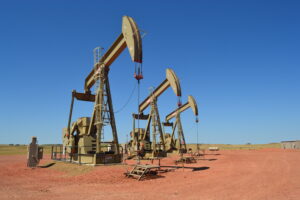RUSSIALINK: “Oil Exports Helping Cushion Russian Economy – IMF” – Moscow Times

(Moscow Times – Oct. 11, 2022) Russia’s recession will be less severe than expected due to oil exports and relatively stable domestic demand, according to the latest International Monetary Fund forecasts released on Tuesday.
While the IMF estimates Russia’s economy to have contracted by 21.8% during the second quarter at a quarterly annualized rate, for the year as a whole the Russian economy is now forecast to contract only 3.4%.
That is a considerable improvement from the 6% annual drop the IMF forecast in June.
“The contraction in Russia’s economy is less severe than earlier projected, reflecting resilience in crude oil exports and in domestic demand with greater fiscal and monetary policy support and a restoration of confidence in the financial system,” the IMF said in its latest World Economic Outlook report.
Western countries have adopted a series of economic sanctions against Russia since its Feb. 24 invasion of Ukraine.
The sanctions have so far had little impact on Russian oil exports, while Moscow appears to have to cut off most of its natural gas exports to Europe in retaliation for sanctions.
Efforts by Western countries to wean themselves off Russian oil have only had limited impact.
“As European and U.S. firms reduced Russian oil purchases, Russian oil was rerouted to China and India at a discount” to global market prices, said the IMF.
Russia has also instituted a series of counter-sanctions and pursued financial and monetary policies to protect its economy, including sharply limited currency exchange in order to protect the ruble.
For 2023, the IMF now expects the Russian economy will contract by 2.3%, an improvement from the 3.5% contraction it forecast in July.
The IMF expects Ukraine’s economy will contract by 35% this year due to the impact of the Russian invasion.
The IMF hasn’t made a forecast for Ukraine for 2023 yet.
The conflict “has led to a severe energy crisis in Europe that is sharply increasing costs of living and hampering economic activity,” said the IMF.
“More broadly, the conflict has also pushed up food prices on world markets… causing serious hardship for low-income households worldwide, and especially so in low-income countries,” it added.
[article also appeared at themoscowtimes.com/2022/10/11/oil-exports-helping-cushion-russian-economy-imf-a79058]
